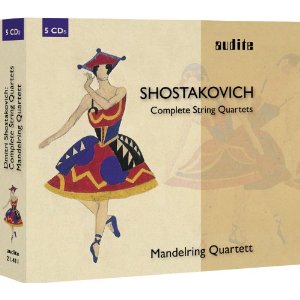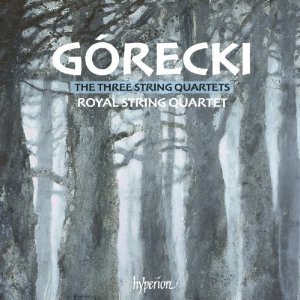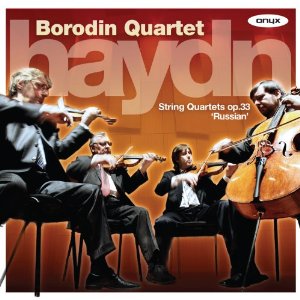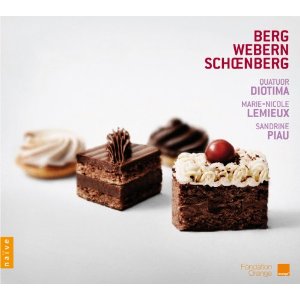Classical CDs Weekly: Górecki, Haydn, Shostakovich, Second Viennese School | reviews, news & interviews
Classical CDs Weekly: Górecki, Haydn, Shostakovich, Second Viennese School
Classical CDs Weekly: Górecki, Haydn, Shostakovich, Second Viennese School
A quartet of string quartet recordings is sized up and assessed
It’s string-quartet Saturday – a young German group tackle Soviet classics and a rejuvenated Russian quartet smile with Haydn. There’s music from a contemporary Polish master and exquisitely uncomfortable fin-de-siècle music from Vienna.
 Shostakovich: Complete String Quartets Mandelring Quartet (Audite)
Shostakovich: Complete String Quartets Mandelring Quartet (Audite)
These are wonderful performances. The Mandelring Quartet don’t overplay the savagery and shocks - their approach is lyrical, sane and effortlessly musical. They can deploy the big guns when necessary – the second movement of the 10th quartet is a good example – but they always care about the line, the musical argument. You’re not lectured or shouted at, but drawn in. Shostakovich’s quartets plot an interesting trajectory, from the superficially lightweight First of 1938 to the death-haunted 15th completed in 1974. The last works have their profoundly depressing moments, but these players accentuate the glimpses of light – the powerful, defiant major coda to the 12th or the radiant harmonic language of the 14th.
There’s a body and lack of shrillness to the string sound – helped by nicely nourished viola and cello tone, so that the more aggressive climaxes don’t sound like offcuts from Bernard Hermann’s Psycho soundtrack. It’s hard to single out the highlights, but both the Fifth and Sixth quartets with their blend of desperation, wistfulness and hard-earned joy nearly reduced me to tears. I was gripped as these players moved from the Third quartet’s jaunty Fawlty Towers-style opening to far darker, more probing territory. There’s no self-pity, no indulgence. Recorded between 2005 and 2009 and now reissued in a bargain box, these are near-definitive readings of intense, beautifully crafted works – every bit as good as accounts by the vintage Borodin or Fitzwilliam Quartets.
Watch a clip of the Mandelring Quartet's recording session
 Górecki: String Quartets Royal String Quartet (Hyperion)
Górecki: String Quartets Royal String Quartet (Hyperion)
Polish composer Henryk Górecki enjoyed remarkable popularity in the early 1990s when a Dawn Upshaw recording of his Symphony of Sorrowful Songs became a massive worldwide hit – a phenomenon which baffled the composer and many critics, unable to understand why this hour-long, slow, mournful piece touched so many. Commissioned by the Kronos Quartet, Górecki’s three String Quartets were written between 1988 and 1995, the Third subsequently revised in 2005. Listening to the cycle is a fascinating, baffling and occasionally frustrating experience. Górecki’s fondness for protracted stretches of musical stasis can create feelings of incredible tension – as in the concise, punchy First Quartet - but the glacial, slowly shifting passages can feel over-stretched and a little dull. Shostakovich (see above) could write similarly extended adagios in his later works, but he would subtly crank up the stress levels before releasing them with a burst of macabre humour. Górecki’s fast, dissonant passages rarely move with the same fleetness, and don’t always feel like particularly idiomatic quartet writing.
The one-movement Quartet No 1, subtitled Already it is dusk, is the most rewarding piece here – the carefully unfolding opening paragraph giving way to exhilaratingly dissonant and physically exciting music. The slow close is just enigmatic enough, and finishes a 16-minute piece leaving us wanting more. Alas, the massive, 56-minute Quartet No 3 (…songs are sung) is overlong, the prevailing mood too unflinchingly grey. The performances on this two-disc set are excellent: technically assured, with impeccable intonation, and the recording is a stunner. I just wish that I could love the music a little more.
Dawn Upshaw in Górecki’s Third Symphony

Haydn: String Quartets Op 33 Russian Russian Borodin String Quartet (Onyx)
The latest incarnation of the Borodin Quartet give us Haydn’s six Op 33 quartets. Disappointingly, the Russian nickname doesn’t allude to the style, purely to Haydn’s having dedicated them to a Russian duke. Neglected unfairly in favour of Haydn’s symphonies, these are entertaining works, and the Borodins do manage to tone down their muscular style so as not to lose sight of Haydn’s humour. There are laugh-aloud moments here – the baffling "is it over yet?" close of the Second, composed to tease audiences into applauding in the wrong place, is disconcerting and fascinating, as you find yourself counting the beats in order to avoid being wrongfooted. The end, when it does arrive, is strangely inconclusive.
What subtle, clever music this is, the benign, major-key surfaces concealing a wealth of misdirection and compositional ingenuity – the First opening in a bright major key, before slyly slipping into B minor a few bars later, or the plodding low quavers at the start of the Fourth distracting the listener from the gently dissonant harmonies and irregular phrase lengths. These are big-boned, loveable performances, with rhythms so clearly defined and sharply pointed that there’s never any suggestion of heaviness.
 Berg, Webern, Schoenberg: String Quartets Diotima Quartet, with Marie-Nicole Lemieux (contralto) and Sandrine Pau (soprano) (Naïve)
Berg, Webern, Schoenberg: String Quartets Diotima Quartet, with Marie-Nicole Lemieux (contralto) and Sandrine Pau (soprano) (Naïve)
The cover art, a soft-focus image of delectable Viennese cakes, shouldn’t fool anyone – this is music which can curdle milk, so make sure the fridge door is closed. Schoenberg’s Quartet No 2 features a soprano in the last two movements in settings of poems by Stefan George. George’s lyric is wonderfully appropriate, and by the time that conventional harmony has dissolved, we too "feel air from another planet". It’s exquisitely uncomfortable music, and the Diotima Quartet capture nicely the first movement’s queasy uncertainty. Sandrine Pau sings the last movement with ecstatic ease, so much so that Schoenberg’s bold harmonic probing sounds more and more normal: the closing soft major chord comes as a quiet shock.
Webern’s Six Bagatelles, tiny nocturnal scribblings, are equally unsettling – fastidiously played, so that every silence registers. The rarely heard, unpublished Bagatelle, its brief contralto solo sung by Marie-Nicole Lemieux, makes for painful listening, uncharacteristically emotional for this most fastidious of composers. Berg’s Lyric Suite closes a fascinating disc. Like the composer’s Violin Concerto, this is 12-note music at its most approachable and emotionally engaging, the references to Wagner and Mahler clearly audible. In this performance the surprise is in the Largo desolato, where Marie-Nicole Lemieux sings a setting of Baudelaire’s De profundis clamavi. Inserted as a private message to Berg’s lover, it was discovered in 1977 in an annotated copy of the score in the composer’s hand. It’s all brilliant, though not a comfortable listen. I needed a dose of Percy Grainger afterwards.
Explore topics
Share this article
Add comment
more Classical music
 Bell, Perahia, ASMF Chamber Ensemble, Wigmore Hall review - joy in teamwork
A great pianist re-emerges in Schumann, but Beamish and Mendelssohn take the palm
Bell, Perahia, ASMF Chamber Ensemble, Wigmore Hall review - joy in teamwork
A great pianist re-emerges in Schumann, but Beamish and Mendelssohn take the palm
 First Persons: composers Colin Alexander and Héloïse Werner on fantasy in guided improvisation
On five new works allowing an element of freedom in the performance
First Persons: composers Colin Alexander and Héloïse Werner on fantasy in guided improvisation
On five new works allowing an element of freedom in the performance
 First Person: Leeds Lieder Festival director and pianist Joseph Middleton on a beloved organisation back from the brink
Arts Council funding restored after the blow of 2023, new paths are being forged
First Person: Leeds Lieder Festival director and pianist Joseph Middleton on a beloved organisation back from the brink
Arts Council funding restored after the blow of 2023, new paths are being forged
 Classical CDs: Nymphs, magots and buckgoats
Epic symphonies, popular music from 17th century London and an engrossing tribute to a great Spanish pianist
Classical CDs: Nymphs, magots and buckgoats
Epic symphonies, popular music from 17th century London and an engrossing tribute to a great Spanish pianist
 Sheku Kanneh-Mason, Philharmonia Chorus, RPO, Petrenko, RFH review - poetic cello, blazing chorus
Atmospheric Elgar and Weinberg, but Rachmaninov's 'The Bells' takes the palm
Sheku Kanneh-Mason, Philharmonia Chorus, RPO, Petrenko, RFH review - poetic cello, blazing chorus
Atmospheric Elgar and Weinberg, but Rachmaninov's 'The Bells' takes the palm
 Daphnis et Chloé, Tenebrae, LSO, Pappano, Barbican review - lighting up Ravel’s ‘choreographic symphony’
All details outstanding in the lavish canvas of a giant masterpiece
Daphnis et Chloé, Tenebrae, LSO, Pappano, Barbican review - lighting up Ravel’s ‘choreographic symphony’
All details outstanding in the lavish canvas of a giant masterpiece
 Goldscheider, Spence, Britten Sinfonia, Milton Court review - heroic evening songs and a jolly horn ramble
Direct, cheerful new concerto by Huw Watkins, but the programme didn’t quite cohere
Goldscheider, Spence, Britten Sinfonia, Milton Court review - heroic evening songs and a jolly horn ramble
Direct, cheerful new concerto by Huw Watkins, but the programme didn’t quite cohere
 Marwood, Power, Watkins, Hallé, Adès, Bridgewater Hall, Manchester review - sonic adventure and luxuriance
Premiere of a mesmeric piece from composer Oliver Leith
Marwood, Power, Watkins, Hallé, Adès, Bridgewater Hall, Manchester review - sonic adventure and luxuriance
Premiere of a mesmeric piece from composer Oliver Leith
 Elmore String Quartet, Kings Place review - impressive playing from an emerging group
A new work holds its own alongside acknowledged masterpieces
Elmore String Quartet, Kings Place review - impressive playing from an emerging group
A new work holds its own alongside acknowledged masterpieces
 Gilliver, LSO, Roth, Barbican review - the future is bright
Vivid engagement in fresh works by young British composers, and an orchestra on form
Gilliver, LSO, Roth, Barbican review - the future is bright
Vivid engagement in fresh works by young British composers, and an orchestra on form
 Josefowicz, LPO, Järvi, RFH review - friendly monsters
Mighty but accessible Bruckner from a peerless interpreter
Josefowicz, LPO, Järvi, RFH review - friendly monsters
Mighty but accessible Bruckner from a peerless interpreter
 Cargill, Kantos Chamber Choir, Manchester Camerata, Menezes, Stoller Hall, Manchester review - imagination and star quality
Choral-orchestral collaboration is set for great things
Cargill, Kantos Chamber Choir, Manchester Camerata, Menezes, Stoller Hall, Manchester review - imagination and star quality
Choral-orchestral collaboration is set for great things

Comments
...
...